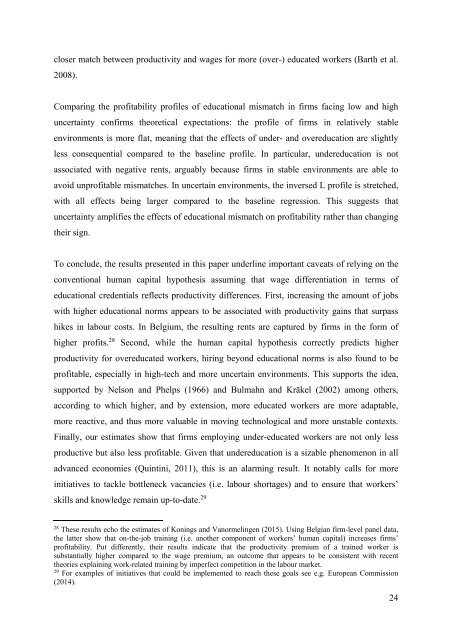CEB Working Paper
240798&r=lma
240798&r=lma
You also want an ePaper? Increase the reach of your titles
YUMPU automatically turns print PDFs into web optimized ePapers that Google loves.
closer match between productivity and wages for more (over-) educated workers (Barth et al.<br />
2008).<br />
Comparing the profitability profiles of educational mismatch in firms facing low and high<br />
uncertainty confirms theoretical expectations: the profile of firms in relatively stable<br />
environments is more flat, meaning that the effects of under- and overeducation are slightly<br />
less consequential compared to the baseline profile. In particular, undereducation is not<br />
associated with negative rents, arguably because firms in stable environments are able to<br />
avoid unprofitable mismatches. In uncertain environments, the inversed L profile is stretched,<br />
with all effects being larger compared to the baseline regression. This suggests that<br />
uncertainty amplifies the effects of educational mismatch on profitability rather than changing<br />
their sign.<br />
To conclude, the results presented in this paper underline important caveats of relying on the<br />
conventional human capital hypothesis assuming that wage differentiation in terms of<br />
educational credentials reflects productivity differences. First, increasing the amount of jobs<br />
with higher educational norms appears to be associated with productivity gains that surpass<br />
hikes in labour costs. In Belgium, the resulting rents are captured by firms in the form of<br />
higher profits. 28 Second, while the human capital hypothesis correctly predicts higher<br />
productivity for overeducated workers, hiring beyond educational norms is also found to be<br />
profitable, especially in high-tech and more uncertain environments. This supports the idea,<br />
supported by Nelson and Phelps (1966) and Bulmahn and Kräkel (2002) among others,<br />
according to which higher, and by extension, more educated workers are more adaptable,<br />
more reactive, and thus more valuable in moving technological and more unstable contexts.<br />
Finally, our estimates show that firms employing under-educated workers are not only less<br />
productive but also less profitable. Given that undereducation is a sizable phenomenon in all<br />
advanced economies (Quintini, 2011), this is an alarming result. It notably calls for more<br />
initiatives to tackle bottleneck vacancies (i.e. labour shortages) and to ensure that workers’<br />
skills and knowledge remain up-to-date. 29<br />
28<br />
These results echo the estimates of Konings and Vanormelingen (2015). Using Belgian firm-level panel data,<br />
the latter show that on-the-job training (i.e. another component of workers’ human capital) increases firms’<br />
profitability. Put differently, their results indicate that the productivity premium of a trained worker is<br />
substantially higher compared to the wage premium, an outcome that appears to be consistent with recent<br />
theories explaining work-related training by imperfect competition in the labour market.<br />
29<br />
For examples of initiatives that could be implemented to reach these goals see e.g. European Commission<br />
(2014).<br />
24


